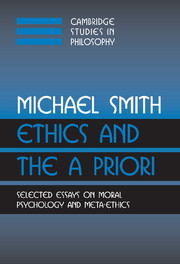Book contents
- Frontmatter
- Contents
- Preface
- Sources
- Introduction
- Part One Moral Psychology
- 1 Internal Reasons
- 2 The Incoherence Argument: Reply to Schafer-Landau
- 3 Philosophy and Commonsense: The Case of Weakness of Will (co-authored with Jeanette Kennett)
- 4 Frog and Toad Lose Control (co-authored with Jeanette Kennett)
- 5 A Theory of Freedom and Responsibility
- 6 Rational Capacities
- 7 On Humeans, Anti-Humeans, and Motivation: A Reply to Pettit
- 8 Humeanism, Psychologism, and the Normative Story
- 9 The Possibility of Philosophy of Action
- Part Two Meta-Ethics
- Index
- References
3 - Philosophy and Commonsense: The Case of Weakness of Will (co-authored with Jeanette Kennett)
Published online by Cambridge University Press: 04 December 2009
- Frontmatter
- Contents
- Preface
- Sources
- Introduction
- Part One Moral Psychology
- 1 Internal Reasons
- 2 The Incoherence Argument: Reply to Schafer-Landau
- 3 Philosophy and Commonsense: The Case of Weakness of Will (co-authored with Jeanette Kennett)
- 4 Frog and Toad Lose Control (co-authored with Jeanette Kennett)
- 5 A Theory of Freedom and Responsibility
- 6 Rational Capacities
- 7 On Humeans, Anti-Humeans, and Motivation: A Reply to Pettit
- 8 Humeanism, Psychologism, and the Normative Story
- 9 The Possibility of Philosophy of Action
- Part Two Meta-Ethics
- Index
- References
Summary
Here is a little story. As he has done a hundred times before, John heads off to the local shop to buy some chocolate bars. He knows that eating so much chocolate isn't good for him. Being over forty and doing no exercise, a passion for chocolate simply adds to an already significant weight problem. But thoughts like this do not move him. Each day, fully cognizant of the effects of eating chocolate upon his health, John heads off to the local shop, arrives, buys several chocolate bars, unwraps one, and then proceeds to eat it, unwraps another, and then proceeds to eat it, and so on and so on and so on.
Now here is a bit of commonsense. In certain crucial respects the story we have just told is underdescribed. For as Gary Watson points out, a story like this can be filled out in at least three different ways, ways that in turn reflect our commonsense understandings of recklessness, weakness of will, and compulsion (Watson 1977). Moreover, whether we fill out the story in one or another of these ways is of great practical significance. For the allocation of moral responsibility is in large part determined by whether we think of John, in the story, as being either reckless, or weak, or compelled.
- Type
- Chapter
- Information
- Ethics and the A PrioriSelected Essays on Moral Psychology and Meta-Ethics, pp. 56 - 72Publisher: Cambridge University PressPrint publication year: 2004



